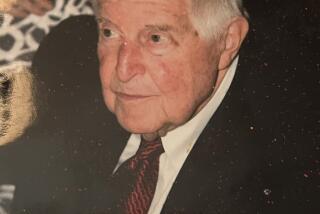Frank Newman, 77; Helped Make Colleges More Inclusive
- Share via
Frank Newman, a former president of the Education Commission of the States and a pioneering reformer of higher education, has died.
Newman, 77, developed melanoma several months ago and died May 29 at the Miriam Hospital in Providence, R.I., said his longtime friend, Arthur F. Levine. Newman had been a resident of Jamestown, R.I.
Levine, president of Teachers College at Columbia University in New York City, said Newman “may have been the most influential person in U.S. education in the past 30 years.”
A dynamo and an unwavering optimist, Newman told friends as recently as two weeks ago that he planned to overcome his illness. Throughout his career, his energy went toward updating education systems in response to changes in society.
Newman was an advocate for nontraditional students -- working parents, minorities and older adults -- and in 1969 put forward a vision for higher education to accommodate them. It became a blueprint for the late 20th century, Levine said.
“Technology, global access, attendance options, for-profit institutions -- Frank drove every one of those agendas,” Levine told The Times on Friday. “He could see what was coming. And he was always right.”
As the president of the Education Commission of the States starting in 1985, Newman met with governors and policymakers, including Bill Clinton, then governor of Arkansas.
“Politicians loved Frank because he was smart and he gave them good advice,” Levine said.
Worried that students were not being trained in citizenship, Newman formed the Campus Compact in 1985 with the presidents of Brown, Stanford and Georgetown universities to foster student involvement in public service work.
“The nature of college students has drifted away from the community to, ‘How do I get my BMW?’ ” Newman said in a 1999 interview with the Providence Journal-Bulletin. By then, the Campus Compact program was in effect at 900 colleges and universities.
Newman was instrumental in the launch of the University of Phoenix in 1976, a private school that offers flexible programs for the education of adults. More recently, he pressed for an update in the training of school administrators.
Born in 1927 and raised in Mamaroneck, N.Y., Newman was one of three children. His father worked for AT&T.; His mother taught elementary school.
He joined the Navy at 17 and received a bachelor’s degree in naval science from Brown University as part of the Navy’s officer training program. He also received a bachelor’s degree in electrical engineering from Brown. He later completed a master’s degree in business administration at Columbia University and a doctorate at Stanford University.
In 1951, he married Lucile Fanning and the couple had three sons. All survive him, as do two grandsons.
For several years, Newman worked at Beckman Instruments in California. In 1966, he ran for Congress in California as a Republican antiwar candidate. He lost that election and gave up politics.
His next job was as public relations director at Stanford. While he was there, in 1969, he was asked by the Department of Health, Education and Welfare to lead a national task force on the reform of higher education.
The Newman Report, as it was known, proposed changes that would better accommodate part-time, minority and other unconventional students.
“People read the report and thought, ‘This doesn’t sound like higher education,’ ” Levine said. “Read it now and it describes exactly what higher education looks like.”
From 1974 to 1983 Newman was president of the University of Rhode Island, where he worked to attract older and returning students, added human services courses and began referring to the globalization of higher education.
He was president of the Education Commission of the States until 1999. During his tenure, he shared a $500-million grant awarded in 1993 by the Annenberg Foundation for the reform of public school education. More than 15 educational groups were involved in the project.
“Frank got the word out to state governors, state commissions and others about the findings of the different groups involved,” Vartan Gregorian, who helped oversee the grant project, told The Times on Friday. Gregorian, president of the Carnegie Corp. in New York City, said that Newman was “practical and yet an idealist. He never became a cynic.”
After leaving the Education Commission of the States, Newman taught classes at Columbia University’s Teachers College and directed a futures project for higher education at Brown University, where his wife is an emeritus professor.
More to Read
Sign up for Essential California
The most important California stories and recommendations in your inbox every morning.
You may occasionally receive promotional content from the Los Angeles Times.













